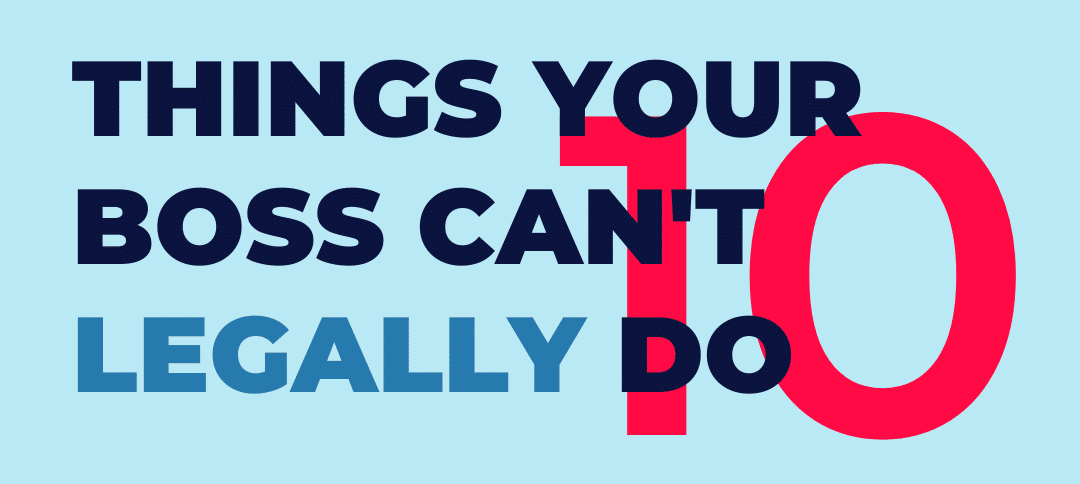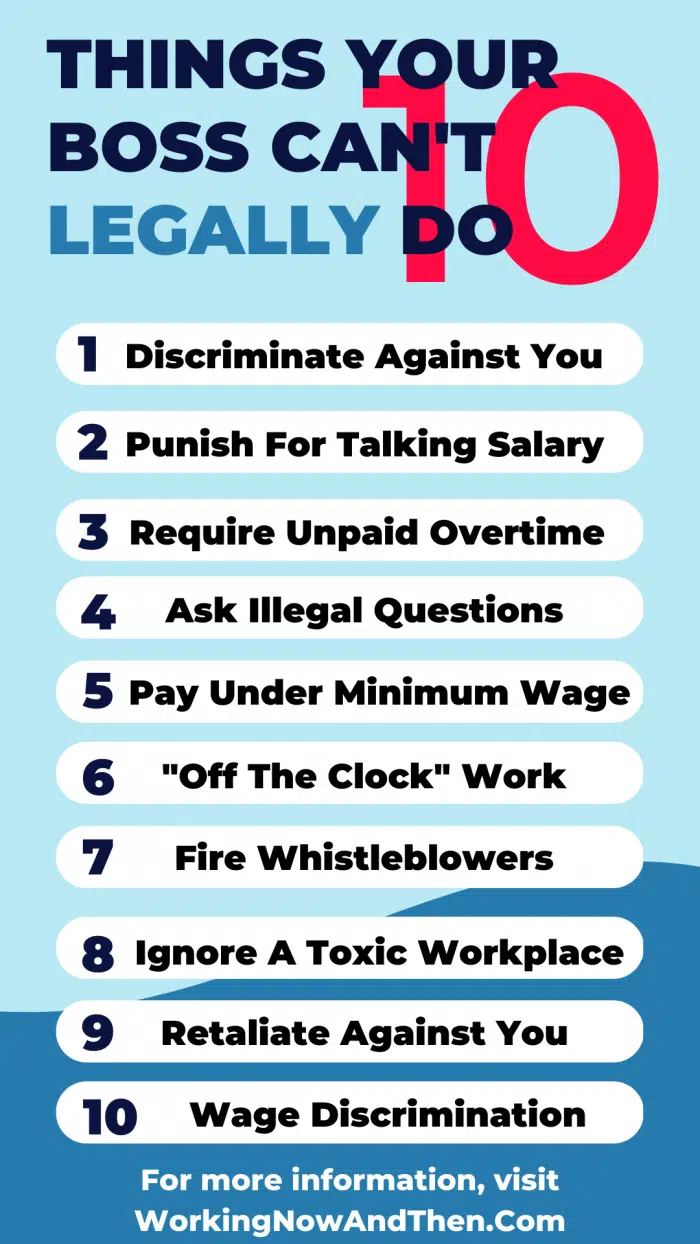
10 Things Your Boss Can’t Legally Do At Work
November 8, 2024
By Charles Joseph, Employment Lawyer
We’ve all had bad bosses. But when does a bad boss break the law? Can your boss yell at you? What about bullying? Is it illegal when your boss expects you to respond to emails outside of work hours?
If you’re dealing with retaliation, unpaid wages, or discrimination from your boss, knowing your rights is the first step to protect yourself.
I have had my share of egregious overt cases. There are villains in these cases and there are heroes.
-Charles Joseph, NYC Employment Attorney
It’s important to know your rights. Here are ten things your boss can’t legally do – and what you can do about it.
#1 Discriminate Against You
Workplace discrimination is a major problem. According to one recent report, 61% of employees have either experienced or witnessed discrimination at work. And nearly half felt their organization did not resolve discriminatory behavior.
Discrimination is at the top of the list of things your boss can’t legally do. It’s against the law to discriminate against employees because of their race, gender, religion, disability, or other protected categories.
What can you do if you experience or witness discrimination? Make sure to document the illegal behavior and consider reporting it to HR.
Want to know more? Check out our resources on workplace discrimination or our FAQ on What is Workplace Discrimination?
#2 Punish You For Talking About Salary
Many companies discourage employees from talking about their pay. But it’s illegal to punish people for discussing wages.
That’s right, your boss can’t legally discipline you if you talk about money with coworkers. The National Labor Relations Act means that employees are allowed to communicate about their compensation.
“Wages are a vital term and condition of employment, and discussions of wages are often preliminary to organizing or other actions for mutual aid or protection,” explains the National Labor Relations Board.
Discussing pay is a great way to uncover wage discrimination, so make sure you understand your rights.
Learn how salary history bans benefit employees.
#3 Make You Work Unpaid Overtime
Overtime laws protect millions of workers. If you qualify for overtime, your boss can’t legally make you work more than 40 hours a week without paying time-and-a-half. That means 1.5 times your usual rate for overtime hours.
The average American puts in nine hours of overtime every week, according to a 2021 survey. That adds up to a huge chunk of money for most workers.
If your boss forces you to work overtime hours and refuses to pay, you might have a case for wage theft.
For more, check out our resources on unpaid overtime or our FAQ on What is Unpaid Overtime?
#4 Ask Illegal Questions During Hiring
Did you know that employment laws protect your rights even before you’re an employee? When you’re applying to jobs or interviewing, your future boss cannot discriminate against you. And there are a lot of things your boss can’t legally do during the hiring process.
The biggest red flag is asking illegal questions in job interviews.
What’s an illegal question to ask during an interview? The hiring manager or boss cannot ask you about your age, country of origin, sexual orientation, or marital status. That’s because they’re not allowed to make hiring decisions based on your answers to those questions.
Unfortunately, it’s difficult to prove discrimination in hiring. As a result, many companies get away with asking illegal questions.
#5 Pay Less Than Minimum Wage
Your boss cannot pay you less than the minimum wage. And yet millions of workers earn less than minimum wage because their companies break the law.
What’s a common minimum wage violation? Paying a flat weekly rate that’s less than the minimum hourly wage. Another common violation is illegal deductions. Your boss cannot illegally take money from your paycheck.
Want to know more? Read our minimum wage resources or learn how to report wage theft.
#6 Ask For “Off The Clock” Work
It’s illegal for your boss to ask for off-the-clock work. If your boss asks you to work before or after your shift without pay, that’s wage theft. And it’s especially bad if that extra work puts your effective wages below minimum wage.
Off-the-clock work can take many forms. It can mean responding to emails or taking phone calls outside of work hours. Even working during a break or mealtime can count as off-the-clock work. But your boss can’t legally make you work without pay.
Do you know all 11 common forms of wage theft? Make sure you’re getting paid fairly.
#7 Fire You For Reporting Law-Breaking
Whistleblowers protect public health and safety. And whistleblower laws protect you from retaliation if you report your boss or company for breaking the law. Firing whistleblowers is a form of wrongful termination.
When I can prove that you complained, I have a much easier time proving that you were wrongfully terminated.
-Charles Joseph, NYC Employment Attorney
In spite of these protections, it’s unfortunately common for companies to fire whistleblowers. If you’re reporting law-breaking, document your company’s response and reach out to an employment lawyer if you experience retaliation.
Learn more with our whistleblower resources or check out our FAQ on What are Whistleblower Protections?
#8 Ignore Toxic Workplace Behavior
Your boss has a responsibility to stop hostile behavior at work. Everyone has a right to work in a professional, harassment-free environment.
When your boss ignores toxic behavior at work, it violates your rights. And if the hostile behavior includes harassment based on sex, race, or other protected characteristics, you might have a hostile work environment claim.
If your boss ignores harassment at work, make sure to document each incident. You can also reach out to an employment lawyer for a consultation.
Do you know the legal definition of a hostile work environment? Get answers from our FAQ on What is a Hostile Work Environment?
#9 Retaliate Against You
Retaliation is illegal. And it’s the most common form of discrimination, according to the EEOC.
But what counts as retaliation? And how do you file a retaliation lawsuit? Legally, workplace retaliation means treating you poorly after you complain about discrimination, harassment, or other illegal actions. Your boss also can’t retaliate against you if you’re a witness in a lawsuit against the company.
Retaliation can take many forms, including wrongful termination. Reach out to an employment lawyer if you experience retaliation at work.
Did you know that workplace retaliation is the most common type of discrimination? Learn more with our FAQ on What is Retaliation?
#10 Underpay You For An Illegal Reason
It’s legal to pay workers different wages. But your boss can’t pay you less for an illegal reason. That qualifies as wage discrimination.
What’s the legal definition of wage discrimination? It means paying someone less because of their gender, race, disability, or any other protected category. For example, companies can’t pay women less than men for the same work. They also can’t pay someone with a disability less because of their disability.
If you suspect you’re being paid less for an illegal reason, contact an employment lawyer.
What counts as wage discrimination? Learn more with our resources on pay discrimination or check out our FAQ on What is Wage Discrimination?
Protecting Employee Rights
Unfortunately, many people have personal experience with things your boss can’t legally do. Even if it’s against the law to discriminate or retaliate, some bosses will keep doing it. And too many employers violate wage laws.
How can you protect your employee rights? First, it’s important to understand the law and your rights. Knowing what things your boss can’t legally do gives you power. Second, make a plan for your next steps. Keep records and reach out to an employment lawyer.
If you’re not sure whether your boss broke the law, contact an employment lawyer. Many offer free consultations on your legal rights. An employment lawyer can also advise you on building a strong case to protect your rights.
Charles Joseph has over two decades of experience in employment law. He is the founding partner of Joseph and Kirschenbaum, a firm that has recovered over $140 million for clients, and the creator of Working Now and Then.
In the NYC area? Contact Charles Joseph for a free consultation on your rights.
